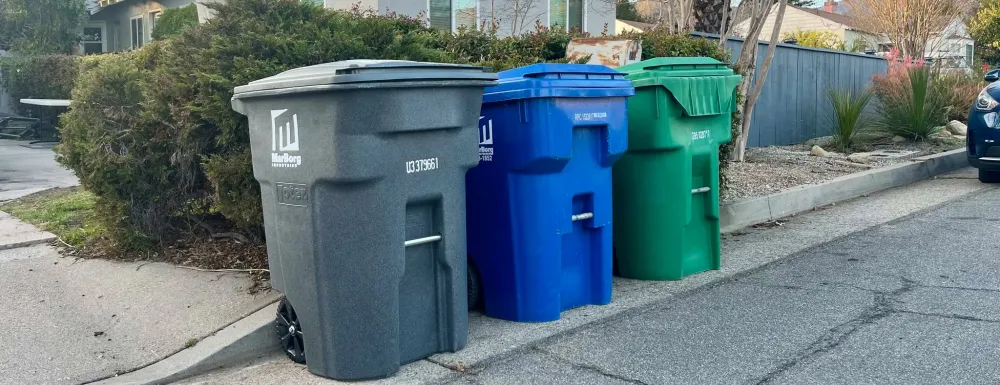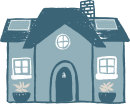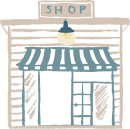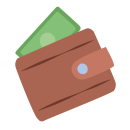
Setup, Change, or Cancel Service
MarBorg Industries: (805) 963-1852
Trash, Recycling, and Yard Waste
The City of Santa Barbara provides a comprehensive set of waste and recycling services through our citywide waste hauler, MarBorg Industries. Different services are available to residential and business customers. In multi-unit residential buildings, collection services are coordinated by the landlord or property manager.
In the City of Santa Barbara, all recycling services are 50% the cost of trash. This includes recycling (blue bin), yard waste (green bin), and foodscraps (yellow bin, currently available to businesses).
For detailed information on services available to residents and businesses in the City of Santa Barbara, please visit the pages below:
Trash
Trash is anything that cannot be placed in the blue recycling, green yard waste, or yellow foodscraps bins, and which also cannot be given away.
For households, our goal is less than 50% trash, and for most businesses, even less than that.
Container Sizes
Trash containers are available in the following sizes:
Cans: 32 gallon
Carts (with wheels): 35, 65, or 95 gallon
Dumpsters: 1.5, 2, 3, or 4 cubic yards
Service Frequency
For Small Residential customers, trash is collected once a week. Businesses and Large Residential customers can receive service up to seven days a week (cost will vary).
The following items are acceptable to place in the trash:
Cat litter or animal feces
Cigarette butts (must be fully extinguished - run under water prior to disposal)
Cooking oil and grease (small amounts from residential use)
Oil and grease should not be poured down the drain because they can clog plumbing. Businesses are responsible for disposing of oil separately.Crosscut shredded paper (if not crosscut, shredded paper can be recycled)
Dental floss
Diapers
Small amounts of dirt, rocks, or stone (reuse if possible!)
Feminine hygiene products
Foil-backed or plastic-backed paper
Food waste (All food waste and other organic matter are separated from the trash and composted at the ReSource Center. DO NOT put food waste in the green yard waste container.)
Incandescent light bulbs (While incandescent light bulbs can be thrown in the trash bin, fluorescent and HID bulbs cannot. These bulbs contain mercury, and must be disposed of as hazardous waste.)
Large items (Contact MarBorg at (805) 963-1852 to schedule a free pickup of furniture, metal, plastic, wood, etc. if a better use is not available.)
Mylar (shiny metallic) bags, candy wrappers, balloons, etc.
Pens and pencils (Try reusable options instead!)
Plastic items mixed with metal, fabric or rubber (mixed materials cannot be recycled)
Plastic labeled "Biodegradable"
Rubber bands
Six-pack ring holders (please cut up)
Sponges
Sticky paper, stickers
Styrofoam (We are currently unable to recycle Styrofoam. Although it may have a recycling symbol, there is currently not a viable market for this material.)
Twist ties
X-Ray film
Appliances (Contact MarBorg at (805) 963-1852 to schedule a free bulky item pickup.)
Recyclable cardboard, glass, metal, paper or plastic (Place these in your blue recycling bin!)
Recycling
Trash is anything that cannot be placed in the blue recycling, green yard waste, or yellow foodscraps bins, and which also cannot be given away.
For households, our goal is less than 50% trash, and for most businesses, even less than that.
Container Sizes
Trash containers are available in the following sizes:
Cans: 32 gallon
Carts (with wheels): 35, 65, or 95 gallon
Dumpsters: 1.5, 2, 3, or 4 cubic yards
Service Frequency
For Small Residential customers, trash is collected once a week. Businesses and Large Residential customers can receive service up to seven days a week (cost will vary).
Blue-Bin Rules-of-Thumb:
All items should be empty/clean, dry, and loose (not bagged).
No Styrofoam or film plastics like plastic bags, plastic wrap, or bubble wrap.
If you're recycling correctly, with no food or liquid contamination, your bin will always be clean with no need for a liner or bag. Plastic bags are not allowed in the blue bin anyway! Plastic Bags are Trash Flyer (English) | Las Bolsas de Plástico Son Basura (Spanish)
The following items are acceptable to place in the recycling:
All metal (no liquids or food)
Aluminum cans
Aluminum foil and trays
Caps and lids from bottles, jars, and steel (tin) cans
Paint cans (must be empty or dry)
Spray cans (must be empty)
Steel (tin) cans, scrap metal, metal parts
Plastic bottles and rigid plastics greater than 6" (no Styrofoam, plastic wrap, or "compostable" or "biodegradable" plastic)
Any liquid bottles: beverage, shampoo, detergent, etc. (empty and with the cap back on)
Buckets (metal handle okay)
Large plastic tubs
Laundry detergent bottles (empty)
Plastic flower pots and trays
Plastic toys (without cords or batteries)
Most paper (must be clean, dry and unsoiled - no paper food and beverage containers)
Paper bags
Books (hardcover books need to have cover and binding removed; paperback books can go right in the bin)
Cardboard (non-waxed, no soiled pizza boxes)
Cereal boxes and paperboard (remove plastic liner)
Computer and office paper
Envelopes (windows okay)
Junk mail and magazines
Newspapers
Packing or kraft paper
Phone books
Shredded paper (not crosscut)
All glass containers (must be empty of any food or liquid)
Glass bottles and jars (metal caps and lids okay)
NO tempered glass like windows or kitchen glassware, as this has been treated for heat, making them hard to recycle
Other Items
Batteries are acceptable in a sealed plastic bag placed on top of (not inside) your blue bin on your regular collection day, or in orange buckets available for apartment buildings.
- Paper food and beverage containers
- Paper cups
- Dairy, soup, or juice cartons
- "Tetra Pak" lined aseptic cartons (shelf-stable products like soy milk and soup cartons)
- All plastic bags and film plastics Plastic Bags are Trash Flyer (English) | Las Bolsas de Plástico Son Basura (Spanish)
- Saran wrap or cling wrap
- Pallet wrap
- Peel-away seals on food containers, food bags, and wrappers, or any other type of flexible plastic wrapping
- Pizza boxes (even if the lid is clean)
- Plastic food containers
- Clear plastic produce containers
- Yogurt cups
- Frozen meal containers
- Salsa cups
- Peanut butter jars
- Plastic labeled "compostable" or "biodegradable"
- Businesses participating in the Foodscraps Program can place "compostable" items in their yellow foodscraps bin
- "Biodegradable" is not a certified standard for any method of disposal and should be reused or placed in the trash
- Common disposable items (to go coffee cups, plastic utensils, plastic plates/cups, Styrofoam, etc.)
- Any food or liquid contaminated materials (grease stained, filled with liquid, impossible to clean all the food out, etc.)
- Ceramic dishware or glassware (place in the trash)
- Clothing, linens, and rags (donate, recycle, or place in the trash)
- Electronics
- Food (residents should place food in the trash or try backyard composting; businesses can sign up for our Foodscraps Program)
Other Items
- Batteries are acceptable in a sealed plastic bag placed on top of (not inside) your blue bin on your regular collection day, or in orange buckets available for apartment buildings.
Yard Waste
Yard waste includes leaves, branches, and grass, but NOT pampas grass or palm fronds, please. More details on what's allowed in the yard waste containers below. Your yard waste is turned into mulch; find out how to Get Free Mulch.
Container Sizes
Yard waste containers are available in the following sizes:
- Cans: 32 gal
- Carts: 35 gal, 65 gal, 95 gal
- Dumpsters: 1.5, 2, 3, 4 cubic yards
Please place green waste loose in your yard waste container (no bags). The following items are acceptable for yard waste:
- Grass clippings
- Leaves
- Ivy
- Flowers
- Small branches and prunings
- Plants
- Plastic bags or pots (Plastic bags should be placed in your trash bin. Plastic pots can be placed in the recycling.)
- Agave
- Cactus
- Cannabis
- Castor bean
- Palm Fronds
- Poison oak
- Thistle
- Yucca
- Eucalyptus
- Oleander
- Succulents
- Invasive species like pampas grass (Pampas grass is an invasive species and is dangerous to use in mulched material. If you have plant material that might be an invasive species, please call (805) 882-3600 and double check before putting it in the yard waste bins.)
- Food waste (If you are a participant in the Foodscraps Program you may put food in your yellow bin.)
- Animal waste or manure
- Sod or dirt
- Rocks
Foodscraps Composting (SB 1383)
Residential Composting
In the City of Santa Barbara all organic material (foodscraps, paper, etc.) placed in the trash is processed into compost and green energy at the County's ReSource Center. Since we have this incredible system, there is no need for a separate residential compost bin. Please continue to discard these organic materials in the trash bin and we've got you covered!
Business Foodscraps Composting Program
Up and running since 2009, Santa Barbara's commercial foodscraps composting program has over 200 participating businesses: coffee shops, restaurants, hotels, schools, plus a few office-based companies and multi-unit apartment buildings.
Did you know businesses that generate 2 cubic yards or more of organic waste per week are mandated to recycle their organic waste? Read about the Mandatory Commercial Organics Recycling Law (AB 1826) at CalRecycle.CA.gov.
Where do we send our foodscraps?
Our foodscraps go from the County Transfer Station to the County of Santa Barbara ReSource Center where they are processed into compost and green energy.
Container Sizes
Outdoor foodscraps containers are available in the following sizes:
- Carts: 35 gal, 65 gal
- Dumpsters: 1.5 & 2 cubic yards (made of heavy-duty plastic to prevent odors and leaking)
Contact us at TrashAndRecycling@SantaBarbaraCA.gov or (805) 564-5631 to schedule a preliminary meeting with a Recycling Specialist to discuss program and service changes.
Schedule training with a Recycling Specialist to educate your staff in foodscraps sorting.
Place colored bins in the kitchen. It is important to keep blue and yellow bins clearly marked and permanently placed. This will make sorting easy for your staff.
Acceptable:
- Food Scraps
- Bread, grains and pasta
- Coffee grounds with paper filter
- Dairy
- Eggshells and eggs
- Fruit (pits and shells too)
- Leftovers and spoiled food
- Meat (including bones)
- Seafood (including shellfish)
- Tea and tea bags
- Vegetables
- Food Soiled Paper
- Coffee filters
- Greasy pizza boxes
- Paper cups and plates
- Paper bags, napkins, tissues and towels
- Paper take-out boxes and container (metal handle OK)
- Parchment Paper
- Natural cork
- Compostable plastic bags and regular clear plastic bags (we allow these for collection but they are removed during processing)
Unacceptable:
- Aluminum foil and trays (Please rinse and recycle these)
- "Biodegradable" plastic ("Biodegradable" is not a certified standard for any method of disposal. Please reuse these materials or put them in the trash)
- Cat litter or animal feces
- Ceramic dishware or glassware
- Clothing linens and rags
- "Compostable" plastic cups, utensils, and plates (If it looks and feels like plastic, it's plastic)
- Cooking oil
- Diapers
- Flower pots or trays (If these are plastic and relatively clean they can be recycled)
- Foil-backed or plastic-backed paper
- Glass, metal, or plastic not labeled "Compostable" (Please recycle these)
- Juice or soy milk type boxes with foil liner
- Liquids or ice
- Plastic bags, wrappers
- Plastic corks (These can go in the recycling)
- Plastic labeled "compostable"
- Recyclable/clean cardboard or paper (Please recycle these)
- Styrofoam (We are currently unable to recycle styrofoam. Although you might see a recycling symbol on it, and it is made of recyclable materials, it is made of so much air that there is currently not a viable market.)



